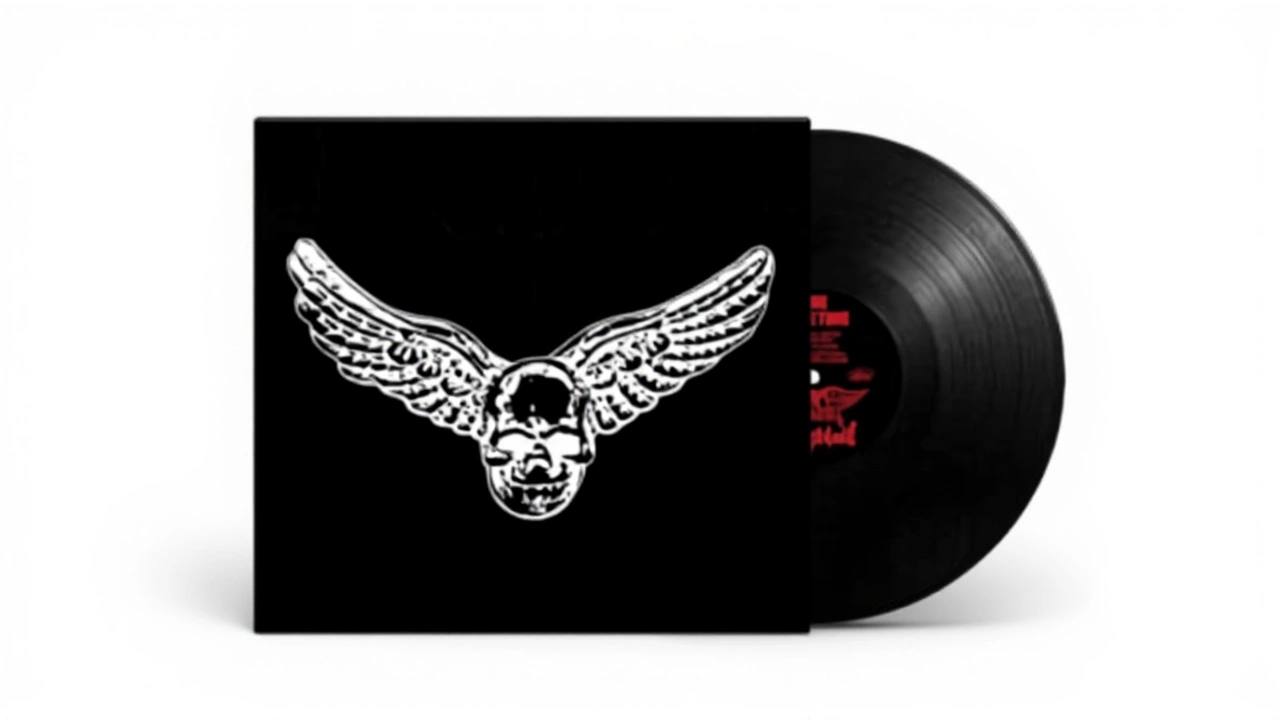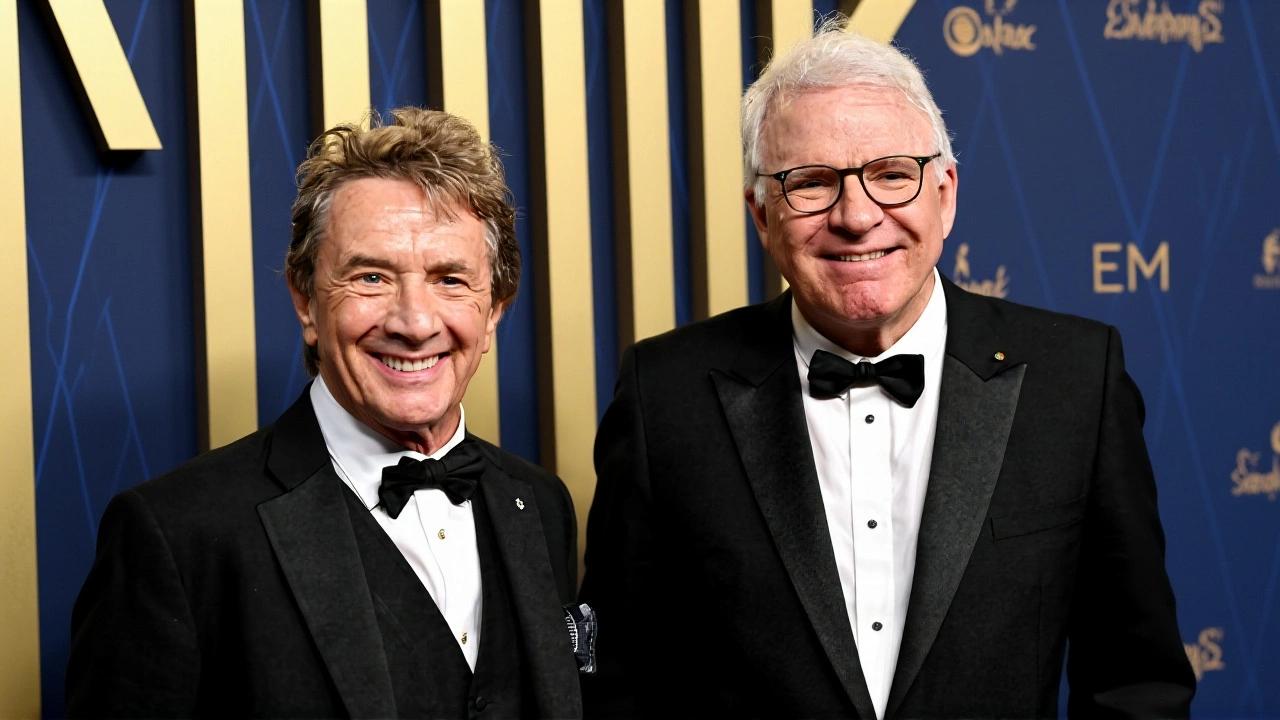Aerosmith, Yungblud, and Steve Martin Unite for Desert Road Revival of 'My Only Angel'
 Nov, 24 2025
Nov, 24 2025
When Aerosmith returned to the studio after a 12-year silence, no one expected them to bring along a banjo—and certainly not from Steve Martin. But on October 24, 2025, the Rock and Roll Hall of Famers dropped My Only Angel (Desert Road Version), a haunting, stripped-down reimagining of their first new song since 2012, featuring a surprise guest: the Grammy-winning comedian and musician whose fingerpicking closes the track like a desert wind. The surprise? It wasn’t just a gimmick. It was the beginning of something deeper—a full collaboration with Yungblud (real name Dominic Harrison), whose raw energy and genre-blurring style have become the unexpected bridge between classic rock and a new generation.
The Song That Broke the Silence
Aerosmith hadn’t released original music since MUSIC FROM ANOTHER DIMENSION! in 2012. Fans had grown accustomed to reunion tours, greatest hits sets, and the occasional live cover. But My Only Angel, first released in September 2025, changed everything. It didn’t just chart—it dominated. Debuting at No. 1 on Billboard’s Hot Hard Rock Songs chart, it held in the Top 10 for three straight weeks and cracked the top 40 on Mainstream Rock Airplay. The song’s moody, cinematic tone, layered with Steven Tyler’s signature rasp and Yungblud’s piercing falsetto, felt both nostalgic and urgent. Then came the Desert Road Version. A slower tempo. Acoustic guitars. A single, echoing drum. And then—out of nowhere—Steve Martin’s banjo. Not as a joke. Not as a cameo. As the emotional climax.
According to uDiscover Music, Tyler personally called Martin after hearing his banjo work on Only Murders in the Building. "I didn’t want a bluegrass track," Tyler told reporters. "I wanted something that sounded like a man walking alone through a canyon at dawn. Steve’s banjo? That’s the sound of regret with a little hope tucked inside." Martin recorded his solo remotely in Los Angeles, sending over three takes. The band picked the third. It lasts 47 seconds. It’s the only moment on the track where silence isn’t an absence—it’s a presence.
How the Collaboration Was Born
The seeds were planted months earlier. In early 2025, Yungblud was in the studio reworking his nine-minute epic Hello Heaven, Hello from his album IDOLS. Aerosmith’s Joe Perry and Steven Tyler dropped by for a casual jam. What started as a guest vocal feature turned into a 14-hour writing session. By dawn, they had the skeleton of Problems and Wild Woman. Within weeks, producer Matt Schwartz had assembled five tracks for the One More Time EP, set for release on November 21, 2025, via Capitol Records.
The EP is a strange, beautiful hybrid: four new songs co-written by Tyler, Perry, and Yungblud, plus a 2025 remix of Aerosmith’s 1977 classic Back In The Saddle. Every track features dual vocals—Tyler’s gravel and Yungblud’s yelp—blending like oil and water that somehow stick. The remix of Back In The Saddle adds modern distortion and a pulsing electronic undercurrent, but keeps the riff intact. It’s not nostalgia. It’s evolution.

A Star-Studded Moment on Stage
Their chemistry was undeniable live. At the 2025 Video Music Awards, Yungblud, Tyler, and Perry—joined by Nuno Bettencourt—delivered a blistering Ozzy Osbourne tribute: Crazy Train, Changes, and Mama, I’m Coming Home. The performance went viral. Fans didn’t just see a rock legend and a punk provocateur. They saw a passing of the torch—not with a bow, but with a scream.
The music video for My Only Angel (Desert Road Version) shows Tyler and Yungblud wandering a desert landscape, guitars in hand, but Martin is nowhere to be seen. His banjo isn’t visual. It’s emotional. You hear it. You feel it. And when it fades, you’re left wondering how two artists from such different worlds—Aerosmith, forged in the ’70s blues-rock furnace, and Yungblud, raised on TikTok and punk poetry—could sound so perfectly aligned.
The Tour That’s Already Sold Out
While the EP drops in November, Yungblud’s IDOLS World Tour is already in full swing. After wrapping its European leg in November 2025, he’ll hit the U.S. with four shows—including a November 26 date at Washington D.C.’s 9:30 Club. Then, Australia: Sydney on January 10, Melbourne on the 13th, Adelaide on the 15th, and Brisbane on the 17th and 18th. But the real shocker? The North American headline tour. Twenty-four dates. Sold out in one minute.
The tour kicks off May 1, 2026, at Michigan Lottery Amphitheatre in Sterling Heights, then hits Toronto, Columbus, Cincinnati, Radio City Music Hall, and the Greek Theater. Ticket sales didn’t just break records—they broke the system. Servers crashed. Fans queued for hours. One Reddit user wrote: "I didn’t even know I wanted this until I saw it was happening. Now I’ve got tickets to four shows. My bank account hates me. My soul is happy."

Why This Matters
This isn’t just a collaboration. It’s a cultural reset. Aerosmith, often written off as a nostalgia act, is proving they can still innovate. Yungblud, who’s spent years fighting to be taken seriously as more than a "social media artist," now shares a studio with legends who’ve shaped rock history. And Steve Martin? The man who once played banjo on The Tonight Show with Steve Martin and the Steep Canyon Rangers is now anchoring the emotional core of a song that could define a new chapter for rock.
The message is clear: rock isn’t dead. It’s just learning new languages. And sometimes, it needs a banjo to say what a guitar can’t.
Frequently Asked Questions
Is this the first time Steve Martin has played banjo on a rock song?
No, but it’s the first time his banjo has anchored a major rock single. Martin has performed with bluegrass bands like Steep Canyon Rangers since 2009 and contributed to folk and comedy albums, but never before on a hard rock track with global chart ambitions. His solo on "My Only Angel (Desert Road Version)" is his most prominent rock contribution to date.
Why did Aerosmith wait 12 years to release new music?
After 2012’s MUSIC FROM ANOTHER DIMENSION!, Aerosmith faced internal tensions, health issues—including Tyler’s vocal surgery and Perry’s recovery from addiction—and a shift in the music industry that made traditional album cycles less viable. The collaboration with Yungblud reignited their creative spark, offering a fresh perspective and a younger audience that reminded them why they started playing in the first place.
How did Yungblud influence the sound of the EP?
Yungblud brought raw, unfiltered emotion and modern production sensibilities. His songs like "Hello Heaven, Hello" and "Lovesick Lullaby" feature long-form structures and layered vocals, which pushed Aerosmith beyond their classic three-minute format. The EP’s lyrics reflect his confessional style, while his vocal delivery—alternating between screams and whispers—forced Tyler to adapt his phrasing, resulting in a more dynamic, emotionally varied record.
Will there be more music after the EP?
Both parties have hinted at a full-length album. In interviews, Yungblud mentioned they’ve already recorded eight additional tracks together, and Tyler said, "We’re not done talking." The chemistry is too strong to be a one-off. If the EP succeeds, a full collaborative album could arrive as early as 2027, possibly with Steve Martin returning for more instrumentation.
What’s the significance of the "Desert Road Version"?
The "Desert Road Version" strips away the electric energy of the original to reveal the song’s emotional core. It’s a deliberate contrast to the bombast of modern rock, echoing the rawness of early Aerosmith demos and the storytelling of folk traditions. The title suggests isolation and journey—fitting for a band returning after years away and a young artist finding his place among giants.
Can I hear Steve Martin’s banjo on streaming platforms?
Yes. The banjo is clearly audible in the final minute of the track on all major platforms, including Spotify, Apple Music, and YouTube. Audio engineers have even isolated the track for fans, confirming Martin’s playing was recorded live in one take. It’s not layered or processed—it’s pure, unfiltered banjo, and it’s the most human moment on the entire EP.
